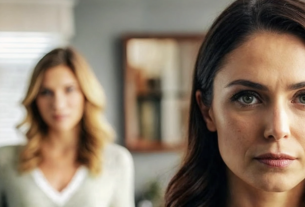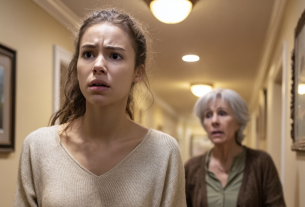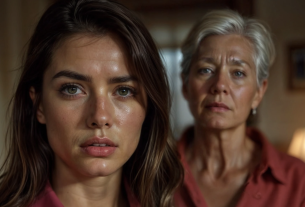A quiet village evening wrapped the surroundings in a gentle dusk when Antonina Semyonovna—whom everyone simply called Granny Tonya—stepped out of her little old house and, walking up to the neighbor’s fence, rapped three times with her knuckles on the windowpane. The glass answered with a dull but familiar sound. A moment later the surprised, wrinkle-lined face of her neighbor Stepanovna appeared in the window. She flung the old, creaking door wide and came out onto the porch, tucking an unruly strand of gray hair behind her ear.
“Tonya, dear, why are you standing there like a stranger on the threshold? Come in, don’t be shy, I’ve just put the kettle on,” she called across the yard, though worry was already audible in her voice.
“No, thank you, Maria Stepanovna, I won’t come in,” Antonina’s voice trembled, and she herself was startled by this sudden weakness. “I’ve got business with you—important business, very important. Listen, neighbor, I need to get to the city, to the regional hospital, the big one. I’ve got a referral, an urgent one. My eyes are in bad shape—I’m worn out with them. They water without stopping; everything blurs before me as if in a thick fog, and at night they ache so much that the white light of day is hateful. Our doctor—he’s still young—looked and threw up his hands: says I need surgery, and right away, otherwise… otherwise I could go blind. How to go, where to go—I can’t make sense of it; I’m alone, all alone. But I think the world isn’t without good people—they’ll tell me, they’ll point me the way.”
“Tonyechka, my dear, of course, of course you must go—don’t delay!” Stepanovna responded at once, shifting from foot to foot in her worn-down slippers. “I’ll look after your place, your little goat Mashka, your hens, everything, everything! Don’t you fret so! You’re right—being left alone in the dark, what grief that could bring! Go, and may the Lord keep you!”
Antonina Semyonovna was well past seventy. Her life, long and unbelievably hard, had dragged her all over, tested her strength, struck her so that it seemed there was no getting back up. But she did get up. And in the end, like a wounded bird, she found a refuge here, in this quiet little village, in a cottage inherited from relatives long since gone. The road to the city seemed endless and frightening. Sitting in the jolting bus, she clutched her battered bag and turned over the same anxious thought again and again.
“A knife… they’ll touch my eyes with a knife? How can that be? The doctor spoke, calmed me—‘Don’t be afraid, granny, it’s not a complicated operation’—but my heart still aches, tightens with some heavy foreboding. I’m scared. Oh, how scared I am to be alone.”
The hospital ward she was placed in was clean and smelled of medicine and quiet. By the window lay a still-young woman, and opposite her an elderly woman like herself. Their company made Antonina Semyonovna feel a little calmer. She sank wearily onto the bed offered to her and thought, “What a misfortune—yet my grief isn’t lonely. This ailment spares neither young nor old.”
After lunch—what they called “quiet hour” there—relatives descended on the ward. The young woman’s husband came rushing in with their school-aged son, laden with bags of fruit and juice. The other neighbor was visited by her daughter with her husband and a little curly-haired granddaughter who laughed silvery laughter and chattered without stopping. They surrounded their mother and grandmother with care, attention, warm words. The ward grew noisy, cheerful—and unbearably lonely. Antonina Semyonovna turned to the wall and brushed away a treacherous tear. No one came to her. No one brought her even an apple, or a simple kind word. Here she was utterly alone, a forgotten old woman needed by no one. Her heart shrank with bitter, piercing envy and hopeless sorrow.
The next morning was rounds. A woman doctor entered the ward in a snow-white, perfectly pressed coat. She was young, beautiful, and radiated such calm and confidence that Granny Tonya felt lighter at once.
“Well, how are we feeling, Antonina Semyonovna? Spirits up, battle-ready?” the doctor’s voice was low, velvety, full of genuine concern and warmth.
“Nothing, nothing, dear, we’re bearing up—what else can we do,” the old woman fussed. “Forgive me, sweet girl, how should I address you—your name and patronymic?”
“Veronika Petrovna. I’m your attending physician. And you, Antonina Semyonovna, tell me—will any relatives be coming to see you? Do you have children? Maybe someone we should notify?”
Granny Tonya’s heart gave a lurch. She lowered her eyes and whispered the first excuse that came to mind, bitter and so far from the truth: “No, dear, I have no one. God didn’t give me children…”
The doctor gently patted her hand, noted something in the chart, and left the room. And Antonina Semyonovna remained sitting on the bed, as if something had burned her from the inside. Her conscience stirred and hammered at her temples. “Why? Why did I lie to that kind woman? Why did I renounce the holiest thing I ever had in my life? It isn’t true, it isn’t!”
She hadn’t wanted to open the old, unhealed wound, the pain she had carried nearly all her life. She bore that pain like a burden that grew heavier and sharper with each passing year. For she did have a daughter. Her precious, beloved, only little girl—Verochka.
Many years ago, in her youth, she had met Pyotr, a war veteran, an invalid who had lost an arm. In those postwar years, when there weren’t enough men to go around, she didn’t hesitate long and married him. For the first years they lived in perfect harmony; a little daughter was born. And then Pyotr fell gravely ill. He took to his bed in an instant, and no matter how they treated him, no folk healers could help—nothing saved him. She buried her husband and was left alone with a tiny daughter in her arms.
In her youth, Antonina had been a real beauty—tall, rosy-cheeked, with a thick braid. She worked on the farm, pulling the load with all her might. And once, into their remote village, a man named Nikolai wandered in for work—a city fellow, handsome and quick-tongued. He noticed the pretty young widow at once and began to court her. And she, starved for simple male attention and affection, lost her head. When the time came for Nikolai to leave, he began to insistently persuade her to drop everything and go with him.
“Vera is little, Kolya—how can I go with her?” she tried to object.
“Leave the girl with your mother—for a little while!” he urged. “We’ll get settled, life will straighten out—and we’ll fetch her right away. I promise you! I’m ready to lay mountains of gold at your feet!”
And she, young and foolish, believed his honeyed words, his promises of a bright life. She had no desire to drag out a miserable existence in a God-forsaken village. She left five-year-old Verochka with her elderly mother and went with her beloved to the far end of the earth, the Far East. It took nearly a week in an overcrowded train.
She and Nikolai found work. At first she wrote her mother often, sent messages, but then they began moving constantly—Nikolai couldn’t stay in one place. Every time she brought up her daughter, he waved it off: “Once we’re settled properly, once we have a place of our own—we’ll bring her at once!” Letters from her mother came less and less often, and then stopped altogether. At first she thought of her daughter constantly, cried at night; but with the years the pain dulled, became muted and habitual. Nikolai only joked it away: “We’ll have our own, and then we’ll bring yours!” But God never granted her more children—as if punishing her for that terrible, fateful choice. Then Nikolai took to drink and began to raise a hand against her. And so went twenty-five long years of wandering and humiliation. The carousel stopped only when Nikolai was killed in a drunken brawl.
After burying her husband, Antonina sold their wretched belongings and with her last money went back to her native places, to her mother and daughter. She traveled with hope and fear, not knowing how she would look into the eyes of the grown daughter she had abandoned for a mirage of happiness.
But no one in the village was waiting for her. Her mother had died several years before, and no one knew anything definite about her daughter—she had come for the funeral and left. The family home stood boarded up and listing. She stayed there three days, trying to learn at least something from the neighbors—in vain. She went to the cemetery, laid modest wildflowers on her mother’s grave, and left for good, drowning in bitter tears of remorse. She moved to another region, to a strange village, where she lived all these years in complete solitude, reproaching herself every day and asking forgiveness in her heart from her darling Verochka. “If I could turn it all back, I would never trade my own flesh and blood for any mountains of gold! But the past won’t return…”
The night before the operation, Granny Tonya couldn’t close her eyes. Despite all the reassurances of kind Veronika Petrovna, her heart clenched with anxiety. She even felt the urge to open up to the doctor, to tell her the whole bitter truth and confess her lie.
“Everything will be fine, Antonina Semyonovna, I promise you. You’ll see perfectly, the pain will go,” Veronika Petrovna said gently, stroking her hand before bed.
But the anxiety wouldn’t let go. Toward dawn a strange, soul-stirring thought suddenly struck her: “Lord, my daughter was called Verochka too… And her patronymic was Petrovna, after her grandfather… Can it really be just a coincidence? And this doctor’s gaze is so familiar, so kind, so dear… I must be sure to ask her surname in the morning… What if?..”
But in the morning an orderly came early, and, flustered, she was wheeled to the operating room. There was no time to ask. After the operation she was long coming out of the anesthesia, and when she finally woke, she found her eyes tightly bandaged. All around was absolute, frightening darkness. She was seized with unbearable fear. “What if I stay in this black pit? Forever?”
She heard her ward-mates moving about and talking while she lay helpless and could see nothing. Suddenly she felt a presence nearby. Someone began gently removing the bandage from her eyes. When the last layer of gauze was taken off, Antonina Semyonovna carefully, fearing disappointment, opened her lids a slit. A nurse stood before her.
“Well, can you see? I’ll go call the doctor,” the nurse smiled.
The surgeon—the man who had performed the operation—came in. He shone a light carefully in her eyes and grunted with satisfaction, “Well now—excellent, just wonderful. Granny, the main thing now is to take care of yourself: no crying, no strain, and all will be well.”
The doctor left, and the smiling nurse set a bag on the bedside table. “This is from Veronika Petrovna for you. Apples, a lemon for colds, and a candy for tea. She said you need vitamins right now. She’s off today.”
“Oh my dear girl, how can this be…” Granny Tonya faltered. “She’s a doctor herself, and she’s bringing treats to an old woman like me… It’s like a little sun just came into the ward…”
She awaited Veronika Petrovna with impatience mixed with a vague, unaccountable foreboding. The doctor came only two days later, for the evening rounds. When she entered, it seemed to Antonina Semyonovna that the room grew brighter, as if the sun truly had come up. In Veronika Petrovna’s hands was an official-looking envelope, and with all her being, with her whole battered soul, the old woman felt there was something very important and thrilling hidden in that paper.
“Good evening, Mama,” Veronika Petrovna said softly as she came to the bed, so that the others wouldn’t hear.
Antonina Semyonovna froze. Her heart hammered wildly up in her throat. “Good evening, dear… But why are you calling me Mama? I’m flattered, of course, but…”
“Because you are my mother,” the doctor’s voice trembled, and tears glinted in her eyes. “Mama, it’s me. Your Verochka. I’ve been looking for you for so long! I’m so happy we’ve finally found each other!”
She sat down on the bed and embraced the old woman, who had turned to stone from shock. The old woman couldn’t believe it. It seemed like a dream, a mirage, a creation of her fevered imagination.
“Daughter?” she breathed, barely audibly. “Is it truly you? Is it really you? How did you find me?” She searched the doctor’s face, trying to make out the features of the little girl she had once left behind. Tears streamed down her wrinkled cheeks and she didn’t even try to wipe them away.
“Hush now, Mama—no crying, that’s the most important rule right now!” Veronika Petrovna said with a smile through her own tears, and brushed at her eyes. “When I picked up your chart, I noticed the surname—Semenova. That was mine before I married. Then I saw your first name and place of birth… and everything turned upside down inside me. I don’t know why you said you had no children, and I’m not the least bit offended. Life takes different turns. I told my husband everything—Matvei, he’s a cardiologist. He insisted himself that we do a genetic test, to be absolutely sure and proper. He took the samples himself and arranged it all. And here—here is the result. The official confirmation. You are my mother. I am your daughter.”
Antonina Semyonovna couldn’t come to her senses from the shock and happiness. She only squeezed her daughter’s hand, afraid she would vanish, dissolve like a mirage.
“Forgive me, my daughter, my dear one, forgive me for leaving you, for not taking you back, for not finding you sooner! How did you live without me? How did you manage?”
“Everything was all right, Mama. Grandmother loved me very much. She died when I was twenty; I was already in medical school. My Matvei helped me a lot at the funeral—we were already seeing each other. We married while still students; it was hard, but we managed. Now we have two children—your grandchildren. They’re almost grown. And they are overjoyed that they have a grandmother now.”
“Daughter, I feel like I’m dreaming… As if I’ve landed on another planet… It’s a miracle!” Antonina Semyonovna wouldn’t release her hand. “If it weren’t for these eyes, if it weren’t for this hospital… God led me here; He gave us a chance to meet!”
“After you’re discharged we’re taking you home with us. We have a big house—we’re already preparing a room for you. You’re not alone anymore. You’re home, Mama.”
That night, again, Antonina Semyonovna didn’t sleep. But this time it wasn’t from fear; it was from the boundless, thunderous happiness overflowing her. She thought of the future, of the grandchildren she was about to meet. “What if they ask, ‘Grandma, where were you all these years?’ What will I tell them? That I went looking for happiness elsewhere and didn’t find it? No, I’ll be honest with them. I’ll tell them the whole truth—so they’ll know, so they’ll understand, and so they’ll value what they have. Thank You, Lord, for this miracle! Now I have family, there’ll be someone to hand me a glass of water in my old age. I’ll pray that they forgive me. If only they forgive me…” With that bright thought she finally fell asleep, an expression of peace and happy contentment frozen on her face.
Granny Tonya’s life found its course. Her daughter forgave her, and in that forgiveness there was so much love and understanding that the old pain slowly began to ebb. She knew she had earned that forgiveness with her long life full of repentance, and now she was no longer afraid to die.
Her son-in-law Matvei—a respectable and very kind man, “a real doctor,” as she called him—soon drove with Veronika to the village to pack her things. With an easy heart, Antonina Semyonovna gave her goat Mashka to her neighbor Stepanovna. The latter was overjoyed—by the gift, of course, but most of all by what she saw in her neighbor: not just healthy and sighted, but truly happy, surrounded by a loving daughter and a caring son-in-law. And in her own faded, elderly eyes there were tears too—but now they were tears of pure, radiant joy for a happiness regained, even if so late.



